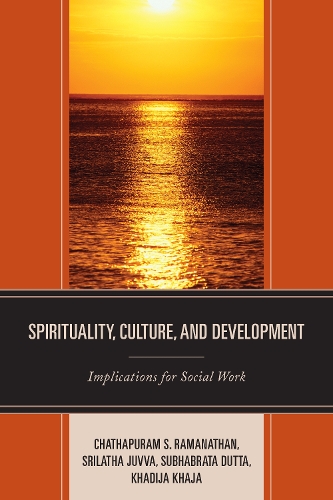
Spirituality, Culture, and Development: Implications for Social Work
(Hardback)
Available Formats
Publishing Details
Spirituality, Culture, and Development: Implications for Social Work
By (Author) Chathapuram S. Ramanathan
Edited by Srilatha Juvva
Edited by Subhabrata Dutta
Edited by Khadija Khaja
Contributions by Shreya Bhandari
Contributions by Subhabrata Dutta
Contributions by Srilatha Juvva
Contributions by Khadija Khaja
Contributions by Rosemary J. Link
Contributions by Mizanur R. Miah
Bloomsbury Publishing PLC
Lexington Books
7th October 2016
United States
Classifications
Professional and Scholarly
Non Fiction
Spirituality and religious experience
Development studies
204
Physical Properties
Hardback
298
Width 158mm, Height 239mm, Spine 28mm
603g
Description
This book explores culture, development, and spirituality from the perspective of social work. This framework serves as foundation and guides analytical deliberation through the use of case studies from around the world. With emerging trends in development, synchronistic synthesis between the inner self and interventions, it is anticipated to contribute to advancing well-being of all people. The book reflects global experiences from both the social work professions and development practitioners perspectives, as it pertains to economic and social development. The book serves as a guide to those who want to better understand and incorporate spirituality into successful social work interventions, practice, and research. It examines social development in the daily lives of children and families by looking at larger national and international phenomenon that can affect the well-being of communities. The book further discusses natural disasters, poverty, war, migration, human trafficking, war, violence and other factors with suggestions of innovative global interventions that have been utilized to assist diverse marginalized groups and communities.
Reviews
This book goes far in presenting wide-ranging political, economic, social, cultural, and religious differences among nations for social work readers around the world. The authors assert that the wisdom or truth of the individualand therefore motivating factor for social justiceis often a spiritual one.Spirituality is writ large here, from organized religions to a mindful connection with self, others, and the world. The book is equally valuable to global western and northern social workers in that it challenges not only the terms first-world and third-world, but also the idea of degree of a countrys development. The authors argue that countries are continuously creating their states, economies and civil societies within their cultures and histories and there is no single desired developed endpoint. In fact, the typical development measures of Gross National Product (GNP) or Gross Domestic Product (GDP) rely heavily on measures of the market. These minimize the value of civil society and progressive state policies evident in the Social Progress Index (SPI) such as ecosystem sustainability, access to healthcare and education, gender equality, attitudes toward immigrants and minorities, religious freedom, and nutrition measures. Understanding development in this way would provide a rather different assessment of the global stage. This book is ambitious and creates an important theoretical foundation on which to build the next installment regarding global development and its relation to spirituality. -- Jessica Toft, University of St. Thomas
The editors and contributors to this path-breaking book offer new and refreshing insights into the complex relationship between spirituality, culture and development. Social workers everywhere will benefit from the books insightful analysis. It deserves to be widely read. -- James Midgley, University of California, Berkeley
Author Bio
Chathapuram S. Ramanathan is chief executive of Human Service Enterprises. Srilatha Juvva is professor of social work at the Tata Institute of Social Sciences. Subhabrata Dutta is professor and head of the Department of Social Work and dean of students welfare at Assam University. Khadija Khaja is associate professor at Indiana University's School of Social Work.
